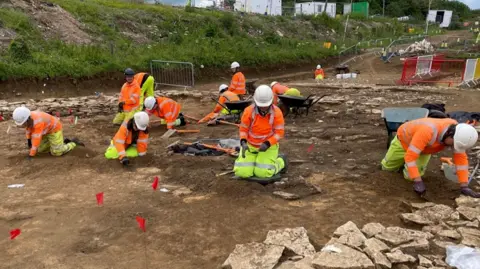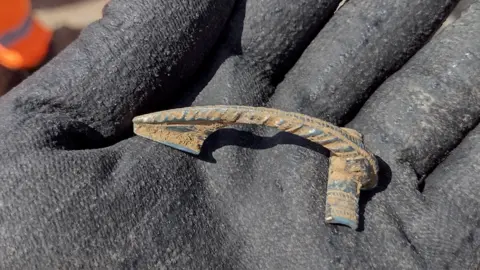Roman settlement dig 'exceeded all expectations'
 BBC
BBCAn archaeological dig on a major road development "exceeded all expectations".
A group of 70 archaeologists undertook excavations on the south-eastern part of the A417 in Gloucestershire for the Missing Link Scheme.
They uncovered a small town across Ermin Way which was a link to many Roman settlements including Cirencester and Gloucester. The work is due to feature on BBC programme Digging for Britain on Wednesday.
Alex Thomson, from Oxford Cotswold Archaeology, added: "Our Roman settlement site was one of the standout areas of our work on the A417 project."
"It's clear that the structures we've recorded helped serve the passing trade on a busy Roman highway; it really could be a 2,000-year-old service station," he added.
 National Highways
National HighwaysThe team uncovered items like ovens, Roman coins, brooches, 420kg of pottery and animal bone, all giving a view into the lives of the settlement's occupants from nearly 2,000 years ago.
National Highways said the settlement's relationship to the Roman road was key, and it is likely that it represented a busy stopping point for those travelling along the Roman highway seeking somewhere to rest and trade.
As well as this, they explained Gloucestershire was at the forefront of Roman expansion into Britain following their invasion in 43 AD.
The Romans quickly built a network of roads to help spread their influence across the south of England, establishing large settlements at Cirencester and Gloucester.
Jim Keyte, National Highways' archaeology project manager for the A417, added: "Being able to explore the traces left by our ancestors provides a unique opportunity to contribute to the story of the Cotswolds and leave a lasting legacy of knowledge for the local community."
Follow BBC Gloucestershire on Facebook, X and Instagram. Send your story ideas to us on email or via WhatsApp on 0800 313 4630.
